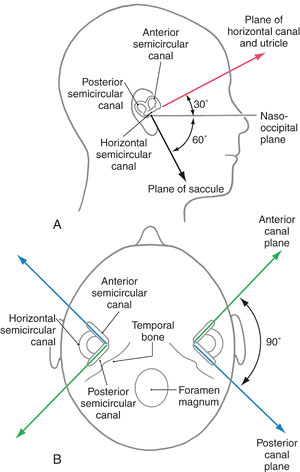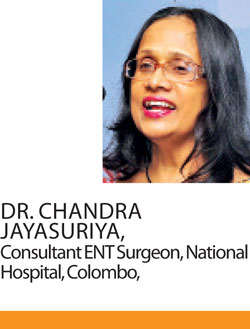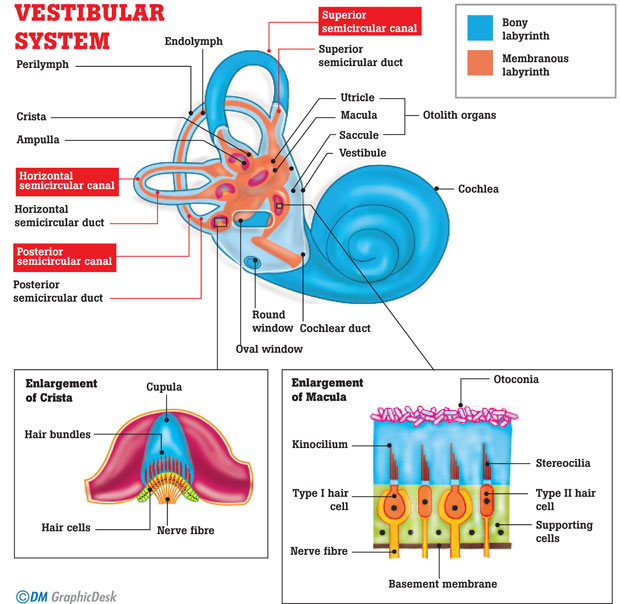26 Jul 2017 - {{hitsCtrl.values.hits}}
 Does the term ‘vertigo’ mean something to you? If not, think in more familiar terms of dizziness or lightheadedness. Chances are that you have experienced this sensation at least once in your life. Even though this is a temporary condition in most cases, pathological vertigo, which can cause a significant handicap in one’s life, is also not uncommon. That’s why we at the Health Capsule decided to speak to
Does the term ‘vertigo’ mean something to you? If not, think in more familiar terms of dizziness or lightheadedness. Chances are that you have experienced this sensation at least once in your life. Even though this is a temporary condition in most cases, pathological vertigo, which can cause a significant handicap in one’s life, is also not uncommon. That’s why we at the Health Capsule decided to speak to
Dr. Chandra Jayasuriya, Consultant ENT surgeon, National Hospital, Colombo,
on behalf of our readers.
Maintaining a balance in our body is a complex process carried out with the participation of multiple systems. Your eyes, the sensors in the muscles and the joints as well as the special balance organs in the inner ear, all collect information on the position of your body, the position of your head and your surroundings and send that information up to your brain. It’s inside this grey matter that all this information is processed and the feedback is sent back to the limbs to maintain balance. Some special reflexes that don’t require processing by the brain are also involved. So, if either of these systems mentioned above are present, it can result in ‘an illusion of movement’ even when you are staying still. In other words this is known as vertigo.
Dr. Jayasuriya explains that the causes for vertigo are sub-divided into Central causes; meaning that the pathology is in the brain, Peripheral causes; where the disease is in sensory or motor organs like the inner ear, the eyes or the nerves and functional causes; where the symptoms appear due to a psychological reason.
“Taking a close look at history is vital since history is the key to diagnosis in case of vertigo”, says Dr. Jayasuriya. The duration of the symptoms in a single episode will give an idea about the disease. We’ll talk about some of these diseases in detail, later in the article. “If the dizziness only lasts for seconds, it’s most likely due to BPPV. If it lasts for minutes to hours, it may be due to causes like Meniere’s Disease or Vestibular Migraines. Likewise, causes for dizziness that last for days to weeks and for more than three months can also be determined”, she continues.
There are two types of vertigo according to their presentation,
1. Spinning or rotatory vertigo, where the patient complaints of a definitive spinning sensation
2.Postural imbalance, which is a feeling of being off balance, without Vertigo
Out of these, the first group is more likely to have pathology in their inner ear or the balance pathway in the brain.

Figuring out what triggers or aggravates the condition is also crucial in diagnosis and later, in the treatment process. BPPV is frequently triggered by jerky head movements and changes in the head position. In the case of some functional diseases, the dizzy sensation may be triggered by certain social situations like empty rooms, bridges and supermarkets. “If the symptoms occur at night, this is likely due to an inner ear cause. This is because without the vestibule system functioning properly, they depend on their vision for balance and losing the advantage of vision in the dark may thus trigger the symptoms”, comments Dr. Jayasuriya. Dizziness is a common side effect of certain drugs as well.
After obtaining a detailed history from you, your doctor will examine you thoroughly, while you are sitting, standing and lying.
Mode of the treatment depends on the diagnosis. A condition like BPPV may be cured within minutes using a single maneuver in the outpatient clinic, while a condition like Meniere’s disease will need lifelong treatment.
Now, let’s go through some of the commonest causes for Vertigo.
Functional vertigo is also very common. This may be purely psycotrophical or can follow a bout of illness causing vertigo, with the body playing sick even after the disease is cured. This causes the patient to experience the symptoms. These patients usually have features of anxiety during an attack like sweating. “Reassuring the patient, regular exercise and behavioral therapy can go a long way towards curing the symptoms,” concludes Dr. Jayasuriya.

This condition is suspected when the patients have longer attacks of vertigo more than once, hearing loss, tinnitus (ringing sensation in ear) and ear fullness. It needs lifelong medical treatment as well as lifestyle modifications which includes a low salt diet.
Vertigo due to migraine is very common. Episodic vertigo with imbalance and, sensory amplification, along with other symptoms can be seen.
“Most likely cause for the vertigo in females who are in child bearing age is migraine” says Dr. Jayasuriya
“Lifestyle modifications is a must. Avoid poor sleep, stress, using the phone in bed while the lights are turned off and playing computer games since these are known to trigger migraine,” is her advice to the patients.

BPPV, which stands for Benign Paroxysmal Positional Vertigo, is the commonest cause for peripheral vertigo worldwide and has an interesting pathology. The inner ear contains two systems. Cochlear system; involved in hearing and vestibular system; which concerns balance. Among the organs of the vestibular system are three fluid filled canals. Each canal represents one of the three axes of the head, supplying information regarding head rotation, with the help of fluid movement within.
In BPPV, Otoconia, a type of crystals from another part of the vestibular system, gets dislodged and enters the fluid in a canal. This causes the generation of erroneous information when moving the head.
This condition causes a special eye movement called nystagmus, where the eyes move rapidly and uncontrollably when turning the head to the side. The main treatment for BPPV is a relatively simple non-invasive procedure called Epley maneuver. This causes the crystal in the canal to return to its original place, curing the symptoms.
Since balance is a crucial part of our day-to-day activities, losing it can be a frustrating experience for a person. As our discussion with Dr. Jayasuriya revealed, medical science can do wonders towards relieving the symptoms, so if you or your loved ones are suffering from vertigo, head over to the nearest hospital and make your world to ‘stop spinning’.
Tell us what you think
Your feedback is very important to us. We can help you resolve your health concerns and problems. Tell us how we can improve with ideas, suggestions and comments. Your queries on the stories we have found for you are also welcome. Write to us at
[email protected]. Let us help you achieve your health and fitness goals with
‘Health Capsule.’
23 Dec 2024 8 hours ago
23 Dec 2024 9 hours ago
23 Dec 2024 23 Dec 2024
23 Dec 2024 23 Dec 2024